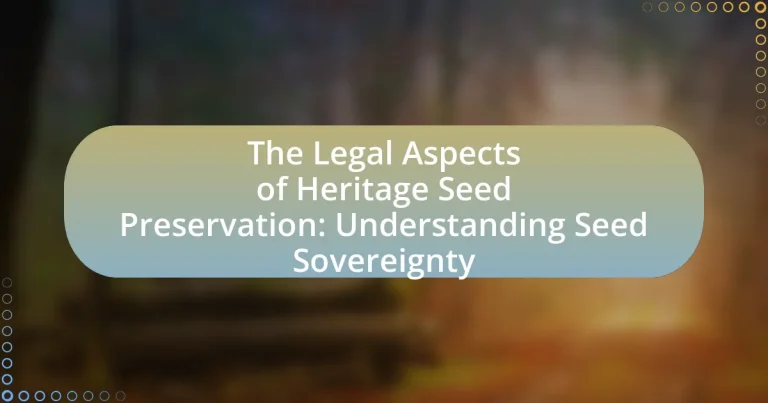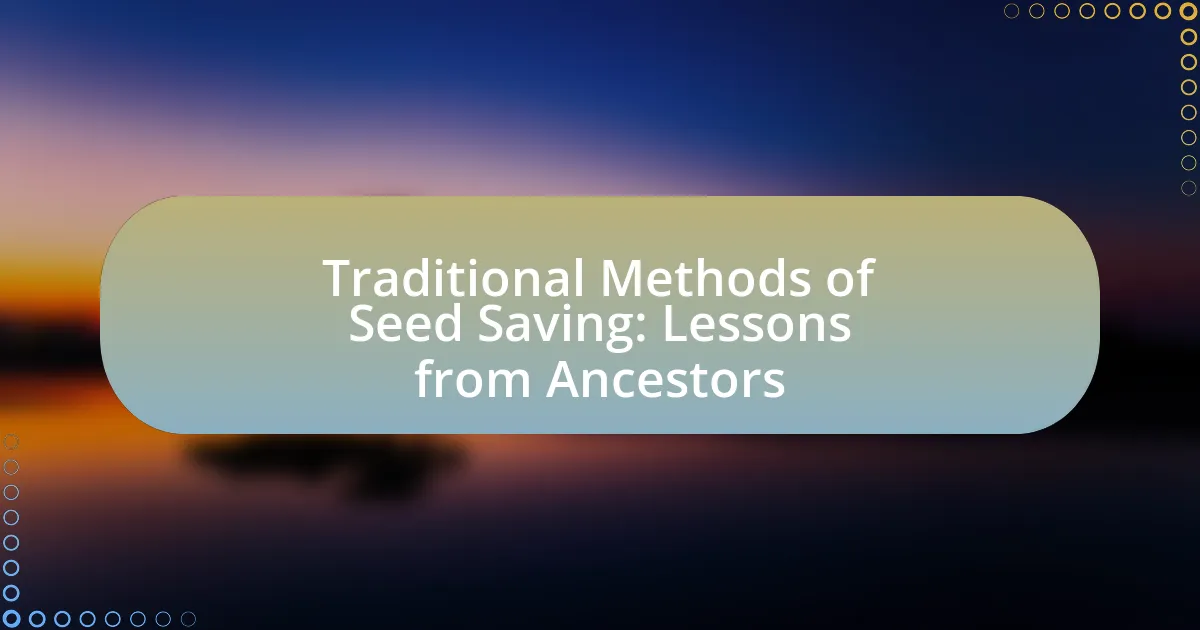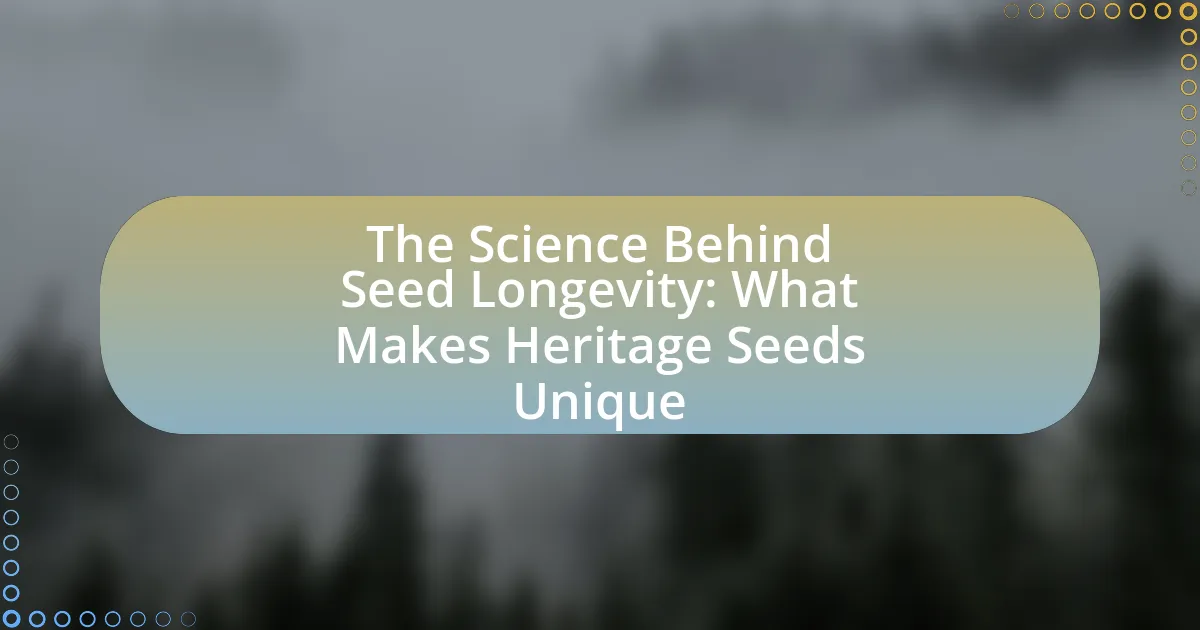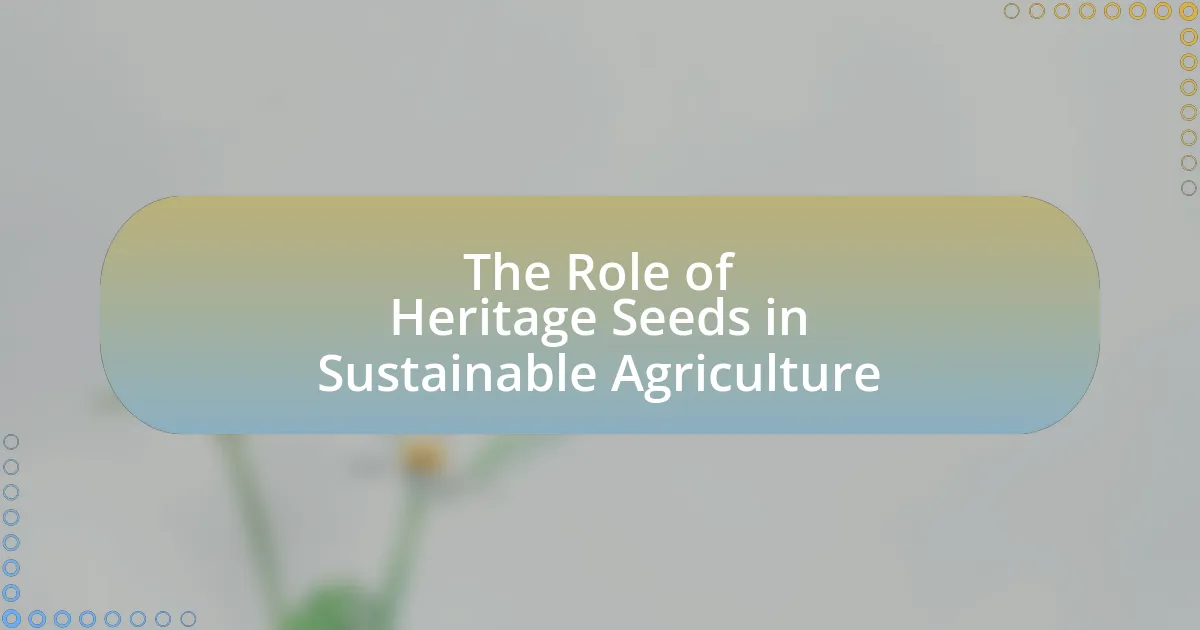The article focuses on the legal aspects of heritage seed preservation, emphasizing the concepts of seed sovereignty and the regulations that govern seed saving and exchange. It examines how intellectual property laws, such as patents and plant variety protection, can restrict farmers’ rights to save and share heritage seeds, while also highlighting the importance of community control over seed resources. The article discusses the varying legal frameworks across different countries, the challenges faced by heritage seed preservers, and the ethical considerations surrounding seed ownership and biodiversity. Additionally, it outlines best practices for preserving heritage seeds and the resources available for individuals and communities interested in advocating for seed sovereignty.
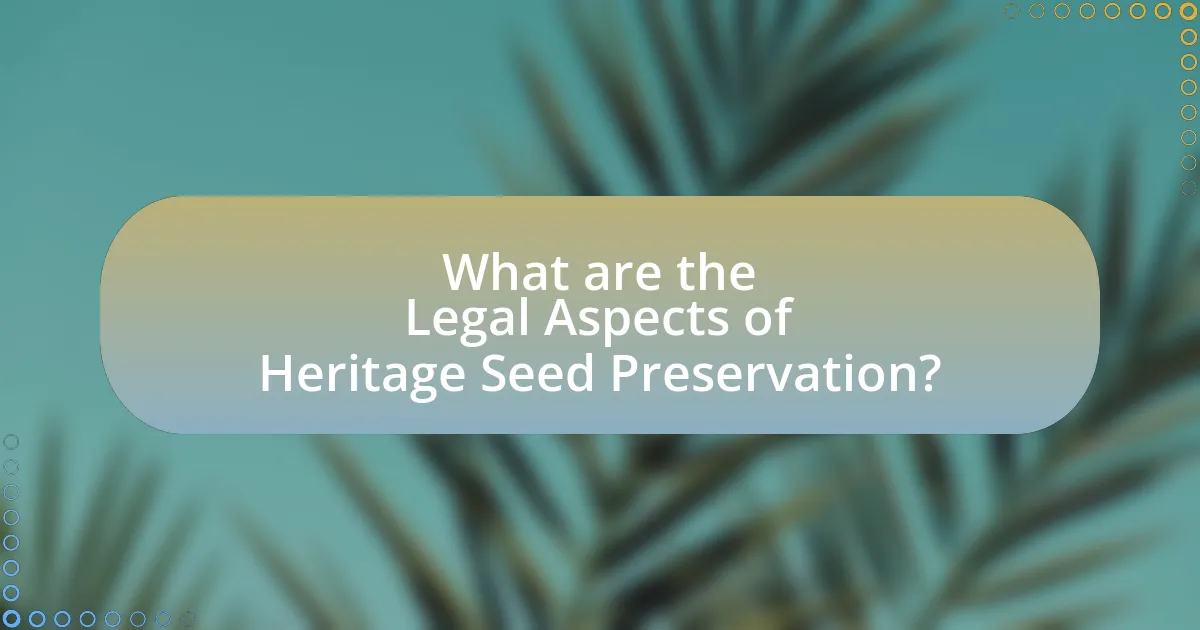
What are the Legal Aspects of Heritage Seed Preservation?
The legal aspects of heritage seed preservation primarily involve intellectual property rights, seed sovereignty, and regulations governing seed saving and exchange. Intellectual property laws, such as patents and plant variety protection, can restrict the ability of farmers and communities to save and share heritage seeds, as these seeds may be patented or protected under specific legislation. Seed sovereignty refers to the rights of communities to control their own seed resources, which is often challenged by corporate interests and international trade agreements that favor large agribusinesses. Regulations vary by country, with some nations implementing laws that support the preservation of heritage seeds, while others may impose restrictions that hinder their use. For example, the International Treaty on Plant Genetic Resources for Food and Agriculture promotes the conservation and sustainable use of plant genetic resources, emphasizing the importance of traditional knowledge and practices in seed preservation.
How do laws impact heritage seed preservation efforts?
Laws significantly impact heritage seed preservation efforts by establishing regulations that either support or hinder the conservation of traditional seed varieties. For instance, legal frameworks such as the International Treaty on Plant Genetic Resources for Food and Agriculture promote the sharing and preservation of genetic resources, thereby encouraging farmers to maintain heritage seeds. Conversely, stringent intellectual property laws, like patents on genetically modified organisms, can restrict access to traditional seeds, leading to a decline in their cultivation. These legal dynamics directly influence the ability of farmers and communities to preserve and utilize heritage seeds, as evidenced by studies showing that regions with supportive seed laws experience higher rates of heritage seed retention compared to those with restrictive regulations.
What specific regulations govern the preservation of heritage seeds?
The preservation of heritage seeds is governed by specific regulations such as the Plant Variety Protection Act (PVPA) in the United States, which provides legal protection for new varieties of plants, including heritage seeds, while allowing for the preservation and use of traditional varieties. Additionally, the International Treaty on Plant Genetic Resources for Food and Agriculture establishes guidelines for the conservation and sustainable use of plant genetic resources, promoting the rights of farmers to save, use, exchange, and sell seeds. These regulations ensure that heritage seeds are protected from commercial exploitation while supporting biodiversity and traditional agricultural practices.
How do these laws vary across different countries?
Laws regarding heritage seed preservation and seed sovereignty vary significantly across countries. For instance, in the United States, the Plant Variety Protection Act allows for the protection of new plant varieties, but it does not necessarily support the rights of farmers to save and replant seeds. In contrast, India’s Seed Act emphasizes farmers’ rights, allowing them to save, use, and exchange seeds, reflecting a strong commitment to seed sovereignty. Additionally, European Union regulations promote biodiversity and sustainable agriculture, with specific directives aimed at preserving traditional varieties. These differences illustrate how national policies are shaped by cultural, economic, and environmental factors, impacting the legal framework surrounding seed preservation.
Why is seed sovereignty important in the context of heritage seeds?
Seed sovereignty is crucial in the context of heritage seeds because it empowers local communities to control their own seed resources, ensuring the preservation of biodiversity and cultural heritage. This control allows farmers to select, save, and exchange seeds that are adapted to their specific environments and agricultural practices, which is essential for maintaining genetic diversity. Historical evidence shows that traditional farming practices, which rely on heritage seeds, have sustained local food systems for generations, highlighting the importance of seed sovereignty in protecting these practices against industrial agriculture and corporate monopolies.
What does seed sovereignty mean for farmers and communities?
Seed sovereignty refers to the right of farmers and communities to save, use, exchange, and breed seeds, ensuring control over their agricultural practices and food systems. This concept empowers farmers by allowing them to cultivate diverse, locally adapted crops, which enhances food security and resilience against climate change. Additionally, seed sovereignty fosters community cohesion and cultural identity, as traditional seed varieties often carry historical and cultural significance. The recognition of seed sovereignty is supported by international agreements, such as the International Treaty on Plant Genetic Resources for Food and Agriculture, which emphasizes the importance of local seed systems in maintaining biodiversity and sustainable agriculture.
How does seed sovereignty relate to biodiversity and food security?
Seed sovereignty directly influences biodiversity and food security by empowering local communities to control their seed resources, which fosters the preservation of diverse plant varieties. When communities maintain control over seeds, they can cultivate a wider range of crops that are better adapted to local conditions, thus enhancing agricultural resilience and biodiversity. Research indicates that diverse cropping systems can improve food security by providing a buffer against pests, diseases, and climate variability, as seen in studies conducted by the Food and Agriculture Organization, which highlight the importance of genetic diversity in sustainable agriculture. Therefore, seed sovereignty not only supports the conservation of biodiversity but also strengthens food security by ensuring that communities can grow and access a variety of nutritious foods.

What are the Challenges in Heritage Seed Preservation?
The challenges in heritage seed preservation include genetic erosion, loss of biodiversity, and legal restrictions on seed saving. Genetic erosion occurs when traditional varieties are replaced by commercial hybrids, leading to a decline in genetic diversity essential for food security. Loss of biodiversity is exacerbated by industrial agriculture practices that favor monocultures, which threaten the survival of heritage seeds. Legal restrictions, such as intellectual property laws and seed patenting, hinder farmers’ rights to save and exchange seeds, further complicating preservation efforts. These factors collectively undermine the sustainability of heritage seed varieties, which are crucial for maintaining agricultural resilience and cultural heritage.
What legal challenges do heritage seed preservers face?
Heritage seed preservers face significant legal challenges primarily due to restrictive intellectual property laws that favor commercial seed companies. These laws, such as the Plant Variety Protection Act in the United States, can limit the ability of preservers to save, share, and sell seeds without infringing on patents. Additionally, heritage seed preservers often encounter difficulties with regulations that require seed certification and labeling, which can impose financial and bureaucratic burdens. The increasing trend of seed privatization and the enforcement of seed patents further complicate the preservation of genetic diversity, as it can lead to legal actions against those who cultivate or distribute unregistered varieties.
How do intellectual property laws affect heritage seeds?
Intellectual property laws significantly impact heritage seeds by restricting their use and distribution through patents and trademarks. These laws can limit farmers’ ability to save, share, and cultivate heritage seeds, as many are subject to proprietary claims that prioritize commercial interests over traditional agricultural practices. For instance, the introduction of the Plant Variety Protection Act in the United States allows breeders to obtain exclusive rights to new varieties, which can lead to the commercialization of seeds that were once freely shared among communities. This legal framework can undermine seed sovereignty, as it often favors large agribusinesses over small-scale farmers who rely on heritage seeds for biodiversity and cultural heritage.
What role do multinational corporations play in these challenges?
Multinational corporations significantly influence the challenges surrounding heritage seed preservation and seed sovereignty by promoting proprietary seed technologies and practices that often undermine local agricultural systems. These corporations, such as Monsanto and Syngenta, develop genetically modified seeds that are patented, limiting farmers’ rights to save and exchange seeds, which is a traditional practice essential for maintaining biodiversity. Research indicates that over 75% of global seed sales are controlled by just a few multinational companies, leading to reduced genetic diversity and increased dependency on commercial seed sources. This concentration of power can create barriers for local farmers, who may face legal repercussions for using traditional seeds or saving seeds from hybrid crops, thus exacerbating the challenges of seed sovereignty.
How do cultural and ethical considerations influence heritage seed laws?
Cultural and ethical considerations significantly influence heritage seed laws by shaping the frameworks that govern seed preservation and access. These laws often reflect the values and traditions of indigenous and local communities, emphasizing the importance of maintaining biodiversity and protecting traditional agricultural practices. For instance, many heritage seed laws incorporate principles of seed sovereignty, which advocate for the rights of communities to control their own seed resources, as seen in the 2001 International Treaty on Plant Genetic Resources for Food and Agriculture. This treaty recognizes the role of local knowledge and cultural heritage in seed conservation, thereby reinforcing ethical obligations to respect and protect indigenous practices. Additionally, ethical considerations around biopiracy and the commodification of genetic resources lead to stricter regulations that aim to prevent exploitation of traditional knowledge without consent.
What ethical dilemmas arise in the preservation of heritage seeds?
The preservation of heritage seeds raises ethical dilemmas primarily related to ownership, biodiversity, and cultural heritage. Ownership issues arise when determining who has the rights to heritage seeds, especially when they are often sourced from indigenous communities that have cultivated them for generations. Biodiversity concerns highlight the ethical responsibility to maintain genetic diversity in agriculture, as the loss of heritage seeds can lead to increased vulnerability to pests and climate change. Additionally, the preservation of cultural heritage is at stake, as these seeds are integral to the identity and traditions of specific communities. The ethical implications of commercializing heritage seeds also pose dilemmas, as profit motives can conflict with the values of conservation and community rights.
How do cultural practices shape the legal landscape of seed preservation?
Cultural practices significantly influence the legal landscape of seed preservation by establishing norms and values that prioritize biodiversity and traditional agricultural methods. These practices often lead to the recognition of seed sovereignty, where communities assert their rights to save, use, and exchange seeds, thereby shaping laws that protect these rights. For instance, in many indigenous cultures, the practice of seed saving is integral to their identity and agricultural heritage, prompting legal frameworks that support the protection of traditional knowledge and the rights of farmers. This is evident in legal instruments like the International Treaty on Plant Genetic Resources for Food and Agriculture, which acknowledges the role of local communities in conserving genetic diversity through their cultural practices.

What are the Best Practices for Heritage Seed Preservation?
The best practices for heritage seed preservation include maintaining genetic diversity, using proper storage techniques, and practicing seed saving methods. Genetic diversity is crucial as it ensures resilience against pests and diseases; for instance, preserving a variety of heirloom tomatoes can safeguard against crop failure. Proper storage techniques involve keeping seeds in a cool, dry, and dark environment to prolong viability, with studies indicating that seeds stored at low humidity can last for decades. Additionally, practicing seed saving methods, such as selecting seeds from the healthiest plants and ensuring cross-pollination control, helps maintain the integrity of the seed lineage. These practices collectively support the sustainability and availability of heritage seeds, aligning with the principles of seed sovereignty that advocate for local control over seed resources.
How can individuals and communities effectively preserve heritage seeds?
Individuals and communities can effectively preserve heritage seeds by implementing seed saving practices, establishing community seed banks, and promoting local agricultural biodiversity. Seed saving involves collecting and storing seeds from plants that have been grown in local conditions, ensuring that these varieties remain available for future planting. Community seed banks serve as repositories for these seeds, allowing for shared access and the protection of genetic diversity. Additionally, promoting local agricultural biodiversity through education and outreach helps raise awareness about the importance of heritage seeds, fostering a culture of preservation. Research indicates that community-based seed initiatives can enhance food security and resilience, as seen in projects like the Seed Savers Exchange, which has successfully preserved thousands of heirloom varieties since its inception in 1975.
What strategies can be employed to navigate legal frameworks?
To navigate legal frameworks effectively, individuals and organizations should employ strategies such as thorough research, legal consultation, and proactive engagement with policymakers. Thorough research involves understanding relevant laws, regulations, and case precedents that impact heritage seed preservation, which can be complex due to varying jurisdictions. Legal consultation with experts in agricultural law can provide tailored advice and clarify obligations under seed sovereignty laws. Proactive engagement with policymakers allows stakeholders to advocate for favorable regulations and contribute to the development of legal frameworks that support heritage seed preservation. These strategies are essential for ensuring compliance and promoting sustainable practices in the context of seed sovereignty.
How can collaboration enhance heritage seed preservation efforts?
Collaboration can enhance heritage seed preservation efforts by pooling resources, knowledge, and expertise among various stakeholders, including farmers, researchers, and conservation organizations. This collective approach allows for the sharing of best practices and techniques, which can lead to more effective preservation strategies. For instance, collaborative networks can facilitate the exchange of seeds and genetic material, ensuring a diverse gene pool that strengthens resilience against pests and climate change. Additionally, partnerships can amplify advocacy efforts for legal protections and policies that support seed sovereignty, as seen in initiatives like the Seed Sovereignty Movement, which emphasizes the rights of communities to save and share seeds.
What resources are available for those interested in heritage seed preservation?
Resources available for those interested in heritage seed preservation include seed banks, educational organizations, and online databases. Seed banks, such as the Seed Savers Exchange, provide access to a wide variety of heritage seeds and promote their conservation. Educational organizations like the Organic Seed Alliance offer workshops and resources on seed saving techniques and the importance of biodiversity. Online databases, such as the USDA’s National Plant Germplasm System, provide information on seed varieties and their preservation status. These resources collectively support the efforts of individuals and communities in preserving heritage seeds, ensuring genetic diversity and cultural heritage in agriculture.
Where can one find legal assistance regarding seed sovereignty?
One can find legal assistance regarding seed sovereignty through organizations such as the Center for Food Safety, which provides resources and legal support for issues related to seed rights and agricultural biodiversity. Additionally, local agricultural extension offices and non-profit legal aid organizations often offer guidance on seed sovereignty laws and regulations. These entities are equipped to assist farmers and communities in navigating the legal landscape surrounding seed ownership and preservation, ensuring compliance with both national and international laws.
What organizations support heritage seed preservation initiatives?
Organizations that support heritage seed preservation initiatives include Seed Savers Exchange, the Heritage Seed Library, and the Native Seeds/SEARCH. Seed Savers Exchange, founded in 1975, focuses on preserving heirloom seeds and promoting biodiversity by connecting seed savers across the United States. The Heritage Seed Library, part of the Garden Organic charity in the UK, provides a platform for gardeners to share and grow heritage seeds, ensuring their availability for future generations. Native Seeds/SEARCH, based in the Southwestern United States, works to conserve and distribute seeds from traditional crops of the region, emphasizing the importance of cultural heritage and agricultural diversity. These organizations actively engage in seed preservation efforts, contributing to the broader movement of seed sovereignty and biodiversity conservation.
What practical steps can be taken to advocate for seed sovereignty?
To advocate for seed sovereignty, individuals and organizations can take several practical steps. First, they can educate themselves and their communities about the importance of seed sovereignty, emphasizing its role in food security and biodiversity. This can be achieved through workshops, seminars, and informational campaigns that highlight the benefits of preserving local seed varieties.
Second, advocates can support local farmers and seed savers by participating in or organizing seed exchanges, which promote the sharing and preservation of heritage seeds. This grassroots approach fosters community resilience and encourages the cultivation of diverse crops.
Third, engaging with policymakers is crucial; advocates can lobby for legislation that protects farmers’ rights to save, use, and exchange seeds without restrictions from corporations. This includes supporting laws that recognize and uphold traditional farming practices.
Additionally, forming alliances with other organizations focused on agricultural rights can amplify efforts. Collaborating with groups such as the Seed Sovereignty Movement or local agricultural cooperatives can strengthen advocacy initiatives.
Finally, utilizing social media and other platforms to raise awareness about seed sovereignty issues can mobilize public support and pressure decision-makers to prioritize seed rights. By combining education, community engagement, policy advocacy, and public awareness, effective advocacy for seed sovereignty can be achieved.
